|
|
|
Sort Order |
|
|
|
Items / Page
|
|
|
|
|
|
|
| Srl | Item |
| 1 |
ID:
159763


|
|
|
|
|
| Summary/Abstract |
This article presents an analysis of South Korea’s strategic choices over the Asian Infrastructure Investment Bank (AIIB), the Trans-Pacific Partnership (TPP), and the Terminal High Altitude Area Defense (THAAD) in light of the Sino–US competition in post-Cold War East Asia. South Korea’s puzzling behavior here represents Seoul’s hedging strategy against the uncertain future of the Sino–US competition in East Asia. The driving force of South Korea’s hedging behavior is Seoul’s dual concerns about being excessively dependent on the USA for its security at the time of China’s rapid rise on the one hand and being pulled into a growing China’s sphere of influence at the expense of traditional US–ROK security ties on the other. Reflecting Seoul’s prudent balancing acts between the two superpowers, South Korea’s hedging often results in apparently indecisive and underdetermined strategic choices in the face of the intensifying Sino–US competition. Nevertheless, South Korea’s hedging strategy allows Seoul to deepen extensive economic ties with Beijing while maintaining a traditional security alliance with Washington. The hedging behavior of South Korea, which is uniquely positioned as a strategic partner of rapidly rising China as well as a key security ally of the rebalancing USA, sheds important light on the behavior of middle powers in alliance politics, which has largely been neglected in the current literature.
|
|
|
|
|
|
|
|
|
|
|
|
|
|
|
|
| 2 |
ID:
162505
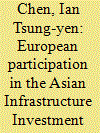

|
|
|
|
|
| Summary/Abstract |
This paper asks why half of the members of the European Union (EU) have chosen to join the China-led Asian Infrastructure Investment Bank (AIIB) in defiance of substantial pressure from Washington. If the AIIB is too good an economic opportunity for Europe to ignore, then why did the rest of the EU turn its back on this organization? To account for this apparent variation in the attitude of European countries, I argue that, ceteris paribus, changes in the strategic situation involving Europe, the USA, and China, as well as differing expectations of economic opportunities in a developing Asia, have led European countries in different directions. Those countries which are getting increasingly friendly with China, which results from increasing level of alliance security dilemma with the USA, and are highly dependent on the potentially gigantic Asian market are the most likely to follow China’s lead. Countries that are not so geared toward China or Asia are least likely to join the AIIB. Where only one of these factors is present, the country will remain hesitant. I test this argument using both quantitative and qualitative analysis. This includes probit analysis for 31 countries and three in-depth case studies involving Germany, Belgium, and Romania. These countries have a high, median, and low chance of joining the bank, respectively. The findings of both types of analysis support the proposed analytical framework.
|
|
|
|
|
|
|
|
|
|
|
|
|
|
|
|
| 3 |
ID:
111553


|
|
|
|
|
| Publication |
2011.
|
| Summary/Abstract |
The White Paper titled China's Peaceful Development is both a paper of declaration and a guideline of action for China's peaceful development. China's peaceful development is based on China's long and profound historical and cultural tradition. We have found this path in the course of the more than 60 years since the founding of the People's Republic of China, especially in the course of the great experiment of reform and opening-up. China's declaration of commitment to peaceful development is a sincere and conscientious long-term strategic choice based on China's basic national conditions. Peaceful development is a carefully considered choice based on calm analysis and sound judgment of the current situation in the world. China's declaration of peaceful development is a choice supported by firm political policies and strategies. China's exploration and practice of following the path of peaceful development will be a never-ending process of constant exploration and improvement. China's path of peaceful development involves more than China itself, and it needs the understanding, support and cooperation of the international community. China's strategic intention for peaceful development is transparent, the goal it pursues is lofty, and its policies are clear-cut. The attitude of China is sincere, its determination is firm and what China says will be honored.
|
|
|
|
|
|
|
|
|
|
|
|
|
|
|
|
| 4 |
ID:
132282
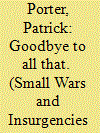

|
|
|
|
|
| Publication |
2014.
|
| Summary/Abstract |
This article reflects on a decade of British counterinsurgency operations. Questioning the idea that lessons have been learnt, the paper challenges the assumptions that are being used to frame future strategic choice. Suggesting that defence engagement is primarily focused on optimising overseas interventions while avoiding a deeper strategic reassessment about whether the UK should be undertaking these sorts of activities, the article calls for a proper debate on Britain's national security interests.
|
|
|
|
|
|
|
|
|
|
|
|
|
|
|
|
| 5 |
ID:
188437
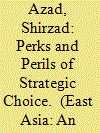

|
|
|
|
|
| Summary/Abstract |
After some two decades of growing partnership between Seoul and Tehran, South Korea’s bilateral relationship with Iran reached a bottom of absolute gloom under the leadership of Moon Jae-in. Most of his presidency coincided with the administration of Donald Trump who followed a relatively contrasting approach toward the North Korean and Iranian nuclear issues. Washington’s Pyongyang and Tehran policies were naturally bound to create opportunities as well as troubles for the Moon-led Korean government’s dealing with North Korea and Iran. Arguing from a perspective of strategic choice, this study asserts that Moon almost forfeited the ROK’s commercial interests in Iran for the sake of advancing his North Korean agenda. As a corollary, the South Korean–Iranian ties sank to an all-time low, culminating in unprecedented diplomatic tensions between the two countries over the issue of Iran’s oil incomes frozen in Seoul. The Mideast country’s subsequent resort to gunboat diplomacy by seizing a Korean oil tanker in the Persian Gulf did also little to break the gridlock over the dilemma of blocked assets because any satisfactory and lasting solution regarding this intractable trouble largely hinged on resolving the fate of Iran’s nuclear deal between Tehran and Washington.
|
|
|
|
|
|
|
|
|
|
|
|
|
|
|
|
| 6 |
ID:
178378


|
|
|
|
|
| Summary/Abstract |
This article analyses the challenges of open and expansive unionism in the era of public sector reform in Zambia. A sample of 20 former and current leaders of the Civil Servants and Allied Workers Union of Zambia was engaged in the research. The research reveals that trade unions in poor countries like Zambia are more vulnerable to the challenges of open and expansive unionism. These include inter-union conflict and lack of resources for union organising. Despite their vulnerability, these unions make strategic choices to deal with these challenges. Their strategies include networking and information gathering and sharing.
|
|
|
|
|
|
|
|
|
|
|
|
|
|
|
|
| 7 |
ID:
117668


|
|
|
| 8 |
ID:
188709
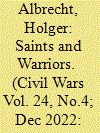

|
|
|
|
|
| Summary/Abstract |
This article explores how rebel groups come into being and how they sustain their activities. Its core premise is that the strategies used in rebel recruitment are crucial for such organisations. Knowing how rebel groups attract members will tell us why they are strong and, by extension, who is getting the upper hand in violent domestic conflicts. Drawing on empirical findings from the Syrian civil war, the article unpacks strategic choices in rebel recruitment: successful rebel groups benefit from the recruitment of combat-ready fighters (warriors) at the time of their inception and of high-commitment rebels (saints) amid sustained insurgent activities.
|
|
|
|
|
|
|
|
|
|
|
|
|
|
|
|
| 9 |
ID:
133843


|
|
|
|
|
| Publication |
2014.
|
| Summary/Abstract |
The author believes that strategic choice of states lies behind the shape of the international order. Originally, the western mainstream theories stress that anarchy is the primary and prerequisite to international relations. It determines strategic choice of states that shapes the international system, promotes its transformation and, therefore, bring about characteristics of the international order.
|
|
|
|
|
|
|
|
|
|
|
|
|
|
|
|
| 10 |
ID:
193806


|
|
|
|
|
| Publication |
Gurugram, Penguin Random House India Pvt Ltd, 2023.
|
| Description |
x, 171p.pbk
|
| Standard Number |
9780143459750
|
|
|
|
|
|
|
|
|
|
|
|
Copies: C:1/I:0,R:0,Q:0
Circulation
| Accession# | Call# | Current Location | Status | Policy | Location |
| 060508 | 808.543/NAR 060508 | Main | On Shelf | General | |
|
|
|
|
| 11 |
ID:
120767
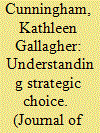

|
|
|
|
|
| Publication |
2013.
|
| Summary/Abstract |
What determines why some self-determination disputes develop into mass nonviolent campaigns, others turn into civil wars, and still others remain entirely in the realm of conventional politics? A great deal of work has addressed the factors that lead to violent mobilization, but less attention has been paid to understanding why disputes become violent or nonviolent, comparing these two as strategic choices relative to conventional politics. This article examines the determinants of strategy choice in self-determination disputes by analyzing how a variety of factors affect the costs and benefits of conventional political strategies, mass nonviolent campaign, and civil war. I find that civil war is more likely, as compared to conventional politics, when self-determination groups are larger, have kin in adjoining states, are excluded from political power, face economic discrimination, are internally fragmented, demand independence, and operate in states at lower levels of economic development. I find that nonviolent campaign is more likely, as compared to conventional politics, when groups are smaller, are less geographically concentrated, are excluded from political power, face economic discrimination, make independence demands, and operate in non-democracies. Examining the full set of strategies available to self-determination groups allows us to more accurately understand why these groups engage in mass nonviolent campaign and civil war.
|
|
|
|
|
|
|
|
|
|
|
|
|
|
|
|
| 12 |
ID:
139399


|
|
|
| 13 |
ID:
168168


|
|
|
|
|
| Summary/Abstract |
Existing research on mediation finds that mediation by a strong mediator is both more prevalent and more conducive to a negotiated settlement. However, why disputants select a weak mediator remains unclear. From the perspective of the uncertainty mechanism, the nature of mediation is a procedure for sharing private information and reducing disputants’ uncertainty regarding the resolve to continue fighting. Disputants can benefit from mediation through gaining a comparative advantage regarding uncertainty by focusing on either controlling the sharing of their own information or increasing their opponents’ sharing of information. With regard to these two strategic choices, this article argues that the selection of a weak mediator is more likely when disputants prefer controlling the sharing of their information to expanding their opponents’ information sharing. Correspondingly, three potential factors that influence the disputants’ strategic choice of gaining a comparative advantage regarding uncertainty are applied, namely, a previous mediation in the dispute; the dispute’s level of hostility; and the power disparity between the disputants. The author compiles data from the International Crisis Behaviour (ICB, 1918–2015) data set and the International Conflict Management (ICM, 1945–2003) data set for the empirical analysis. The results show that mediation by a weak mediator is more likely when it is the first time that the disputants have submitted to mediation in the dispute and when the dispute’s level of hostility is low. In some cases, a large power disparity between the disputants also makes the selection of a weak mediator more likely.
|
|
|
|
|
|
|
|
|
|
|
|
|
|
|
|
| 14 |
ID:
149017
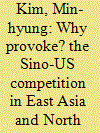

|
|
|
|
|
| Summary/Abstract |
This article seeks to make sense of North Korean provocations in light of the Sino-US strategic competition in post-Cold War East Asia, where such variables as China’s rise, US’s pivot to Asia, and growing Sino-ROK economic ties are driving the strategic choices of major states in the region. The article examines the main motivations behind Pyongyang’s provocations since the end of the Cold War, discusses their implications for the Sino-US strategic competition in East Asia, and offers predictions about the future of North Korean provocations. The central thesis of the article is that Pyongyang has exploited the Sino-US strategic competition in East Asia for its regime survival. By raising North Korea’s strategic value to China, the intensifying Sino-US competition allows Pyongyang to continue provocations, regardless of Beijing’s explicit opposition.
|
|
|
|
|
|
|
|
|
|
|
|
|
|
|
|
|
|
|
|
|